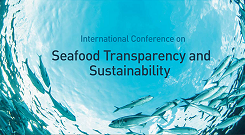Transparency a key theme at international conference in Japan

JAPAN 16-17 May 2017. The Fisheries Transparency Initiative participated in the International Conference on Seafood Transparency and Sustainability, which took place from 16-17 May 2017 in Tokyo, Japan. This conference was co-organized by the Japan Fisheries Research and Education Agency (FRA), Waseda University and The Nature Conservancy (TNC) and was attended by approximately 300 participants, representing government, the private sector, academia, media and intergovernmental and non-governmental organizations.
Given Japan’s position as a major player in the global fishing industry, as both a consumer and producer, the conference provided an ideal opportunity for the multiple Japanese stakeholders concerned with and affected by illegal, unreported or unregulated (IUU) fishing to share information, learn how other nations are addressing seafood transparency and sustainability, and to discuss potential next steps that could increase seafood transparency and sustainability in Japan.
As part of the panel “Strengthening international cooperation for combatting IUU fishing” Mr. Sven Biermann, Director of the FiTI International Secretariat, highlighted the need for transparency and participation for improving fisheries governance. “Transparency and participation are key elements of good governance, which provides the basis for tackling major issues in today’s fisheries, including IUU fishing. Through its recently adopted FiTI Standard, the initiative provides governments, the fishing industry (both large-scale and small-scale), and civil society with a comprehensive and credible way to achieve and maintain high levels of transparency on the management of the marine fisheries sector and the activities of fishers and fishing companies. Through this, the FiTI does not only make fisheries management more transparent and inclusive. It also helps tackling other issues which impact all actors in the fisheries sector, including contributing to food security and nutrition, and social stability, underpinning the sustainability of marine ecosystems, supporting the fight against corruption as well as Illegal, Unreported, and Unregulated Fishing. Furthermore, levels of accountability and openness can have a growing impact on the decisions of consumers and investors and it will become an ever-increasing factor for intergovernmental cooperation in trade and regional fisheries management”, Mr. Biermann emphazised in his presentation.
IISD Reporting Services, through its ENB+ Meeting Coverage, has provided a summary report from the International Conference on Seafood Transparency and Sustainability, which can be accessed here.